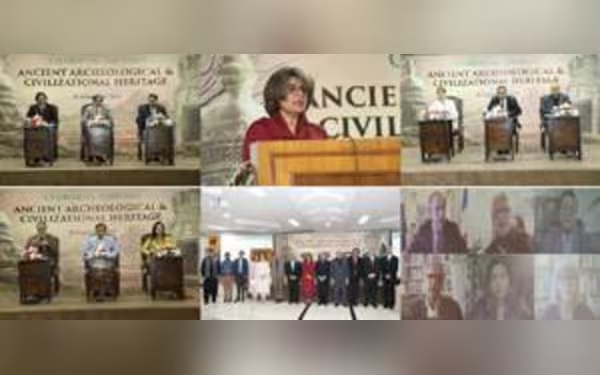Friday, October 4, 2024 07:27 AM
Foreign Secretary Baloch Champions Pakistan’s Archaeological Heritage Preservation
- Foreign Secretary emphasizes commitment to heritage preservation.
- Experts discuss strategies for cultural tourism and conservation.
- Collaboration needed between heritage and tourism sectors.
 Image Credits: nation_pk
Image Credits: nation_pkForeign Secretary Amna Baloch reaffirms commitment to preserving Pakistan's rich archaeological heritage at an international conference.
Pakistan is a country rich in history, with ancient civilizations that have left a profound impact on its cultural landscape. The Indus Valley and Gandhara civilizations, which thrived thousands of years ago, are not just remnants of the past; they are a source of inspiration and pride for the nation. Recognizing the importance of this heritage, Foreign Secretary Amna Baloch recently reaffirmed the government’s commitment to preserving and promoting Pakistan’s archaeological and civilizational treasures during the International Conference on ‘Celebrating Pakistan’s Ancient Archaeological and Civilizational Heritage’.
During her address, Foreign Secretary Baloch expressed her deep pride in Pakistan’s multi-layered legacy. She emphasized that the values of innovation, resilience, and coexistence found in ancient cultures are still relevant today. This highlights the need for a balanced approach to conservation, tourism, and development, ensuring that future generations can also appreciate these cultural assets.
The conference featured several sessions, with experts from various fields discussing the significance of Pakistan’s heritage. Dr. Muhammad Hameed from Punjab University called for new expeditions and restoration of monuments, stressing the collaboration needed between the heritage and tourism sectors. He pointed out that heritage is a source of national pride, which is crucial for fostering a sense of identity among the people.
Prof. Ruth Young from the University of Leicester highlighted the importance of religious sites, particularly Buddhist sites, in shaping Pakistan’s identity. She acknowledged the government’s efforts to enhance the country’s global image through its rich heritage. This sentiment was echoed by Mr. Anjum Javaid, who emphasized the advanced urban planning of the Indus civilization, urging pride in this remarkable heritage that surpasses even that of ancient Egypt and Mesopotamia.
In another session, Ms. Heba Hashmi, a maritime archaeologist, outlined strategies for preserving Pakistan’s historical sites, including the use of digital heritage trails and climate change adaptation. She pointed out the urgent need for flood risk management in archaeological efforts, which is increasingly important in the face of climate change.
Professor Luca Maria Oliveri from the Italian Archaeological Mission to Pakistan shared insights from his work in Swat Valley, emphasizing that conservation sites can serve as training hubs for developing new professionals in the field. This is vital for ensuring that the knowledge and skills needed to protect these sites are passed on to future generations.
Furthermore, Ms. Kiran Afzal from the World Bank discussed the bank’s initiatives in preserving historical sites in Punjab and Khyber Pakhtunkhwa, focusing on job creation and tourism promotion. She highlighted the need for more resources to manage rising maintenance costs, which is a common challenge faced by many heritage sites worldwide.
As the conference progressed, the discussions underscored the potential of cultural tourism, particularly religious tourism, to generate income with minimal investment. Ambassador Asim Iftikhar Ahmed emphasized that Pakistan’s historic civilizations form a shared global legacy, and there is a pressing need for policy measures to promote these heritage sites.
The International Conference on Pakistan’s Ancient Archaeological and Civilizational Heritage served as a vital platform for discussing the preservation of the country’s rich history. The insights shared by experts highlight the importance of safeguarding these treasures not only for their historical value but also for their potential to foster economic growth and cultural understanding. As Pakistan moves forward, it is essential to cherish and protect these ancient legacies, ensuring that they continue to inspire future generations and contribute to a shared global heritage.













